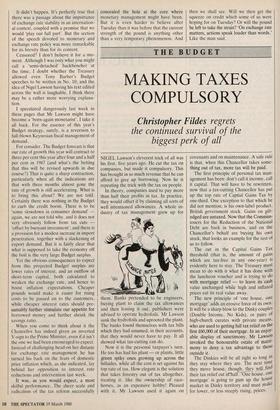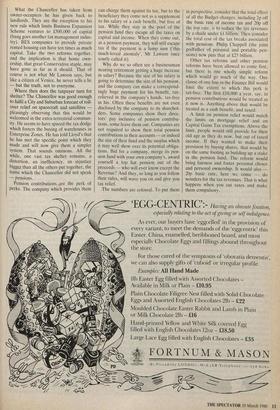THE BUDGET
MAKING TAXES COMPULSORY
Christopher Fildes regrets
the continued survival of the biggest perk of all
NIGEL Lawson's cleverest trick of all was his first, five years ago. He cut the tax on companies, but made it compulsory. This has brought in so much revenue that he can afford to give up borrowing. Now he is repeating the trick with the tax on people.
In theory, companies used to pay more than half their profits in tax. In practice, they would offset if by claiming all sorts of well intentioned allowances. A whole in- dustry of tax management grew up for them. Banks pretended to be engineers, buying plant to claim the tax allowances and then leasing it out, publishers were advised to operate hydrofoils. Mr Lawson sank the hydrofoils and uprooted the plant. The banks found themselves with tax bills which they had assumed, in their accounts, that they would never have to pay. It all showed what tax-cutting can do.
Now it is the personal taxpayer's turn. He too has had his plant — or plants, little green spiky ones growing up across the hillsides, while all the cost is set against his top rate of tax. How elegant is the solution that takes forestry out of tax altogether, treating it. like the ownership of race- horses, as an expensive hobby! Pleased with it. Mr Lawson used it again on covenants and on maintenance. A safe rule is that, when this Chancellor takes some- thing out of tax, more tax will be paid.
The first principle of personal tax man- agement has been: don't call it income, call it capital. That will have to be rewritten, now that a tax-cutting Chancellor has put up the top rate of Captial Gains Tax by one-third. One exception to that which he did not mention, is his own-label product, British government stock. Gains on gilt- edged are untaxed. Now that the Commiss- ioners for the Reduction of the National Debt are back in business, and on the Chancellor's behalf are buying his own stock, that looks an example for the rest of us to follow.
The cut in the Capital Gains Tax threshold (that is, the amount of gains which are tax-free in any one-year) is evidently here to stay. The Treasury must mean to do with it what it has done with the luncheon voucher and is trying to do with mortgage relief — to leave its cash value unchanged while high and inflated prices eat its real value away.
The new principle of 'one house, one mortgage' adds an erosive force of its own. It will be a sharp blow to the Dinky couples (Double Income, No Kids), or pairs of high-church curates with private means, who are used to getting full tax relief on the first £60,000 of their mortgage. In an enjoy- able display of sanctimony, Mr Lawson invoked the honourable estate of matri- mony to deny a tax advantage to those outside it.
The Dinkies will be all right so long as they stay where they are. The next time they move house, though, they wall find their tax relief cut itrhali."One house, one mortgage' is going to gum up the house market in Dinky territory and must make for lower, or less steeply rising, prices. What the Chancellor has taken from owner-occupiers he has given back to landlords. They are the exception to his new rule which limits Business Expansion Scheme ventures to £500,000 of capital (bang goes another tax management indus- try). BES companies to provide private rented housing can have ten times as much capital. Take the two reforms together, and the implication is that home own- ership, that great Conservative staple, may have gone as far as it should. That of course is not what Mr Lawson says, but like a citizen of Venice, he never tells a lie — but the truth, not to everyone.
Where then does the taxpayer turn for shelter? The Chancellor was good enough to fulfil a City and Suburban forecast of roll- over relief on spacecraft and satellites pleasingly observing that this would be welcomed in the extra-terrestrial commun- ity. He seems to have spared the tax dodge which fosters the buying of warehouses in Enterprise Zones. He has told Lloyd's that he has met the specific point which they made and will now give them a simpler system. That sounds ominous. All the while, one vast tax shelter • remains, a distortion, an inefficiency, an injustice bigger than all the others put together, the name which the Chancellor did not speak --- pensions.
Pension contributions are the perk of perks. The company which provides them can charge them against its tax, but to the beneficiary they come not as a supplement to his salary or a cash benefit, but free of tax. While they stay in the pool of the pension fund they escape all the taxes on capital and income. When they come out, as a pension payment, they will still escape tax if the payment is a lump sum ('this much-loved anomaly', Mr Lawson once sourly called it).
Why do we so often see a businessman nearing retirement getting a huge increase in salary? Because the size of his salary is going to determine the size of his pension, and the company can make a correspond- ingly huge payment for his benefit, tax- relieved in the company's hands, tax-free in his. Often these benefits are not even disclosed by the company to its sharehol- ders. Some companies show their direc- tors' pay inclusive of pension contribu- tions, some leave them out. Companies are not required to show their total pension contributions in their accounts — or indeed the size of their fund and the surplus which it may well show over its potential obliga- tions. Bid for a company, merge its pen- sion fund with your own company's, award yourself a top hat pension out of the proceeds — who will ever know except the Revenue? And they, so long as you follow their rules, will wave you on and give you tax relief.
The numbers are colossal. To put them in perspective, consider that the total effect of all the Budget changes, including 2p off the basic rate of income tax and 20p off the top rate, is to reduce the tax revenues by a shade under £4 billion. Then consider the total cost of the tax breaks associated with pensions. Philip Chappell (the joint godfather of personal and portable pen- sions) now puts that at £25 billion.
Other tax reforms and other pension reforms have been allowed to come first, but there is one wholly simple reform which would go much of the way. One clause of one line in the Finance Bill would limit the extent to which this perk is tax-free. The first £10,000 a year, say, in pension contributions would be treated as it now is. Anything above that would be treated as a cash benefit, and taxed.
A limit on pension relief would match the limits on mortgage relief and on Capital Gains Tax exemptions. Above the limit, people would still provide for their old age as they do now, but out of taxed income. If they wanted to make their provision by buying shares, that would be on the same footing as building up a stake in the pension fund. The reform would bring fairness and foster personal choice and personal ownership. It would also 20p basic rate, here we come — do wonders for the tax revenues. That is what happens when you cut taxes and make them compulsory.

























































 Previous page
Previous page